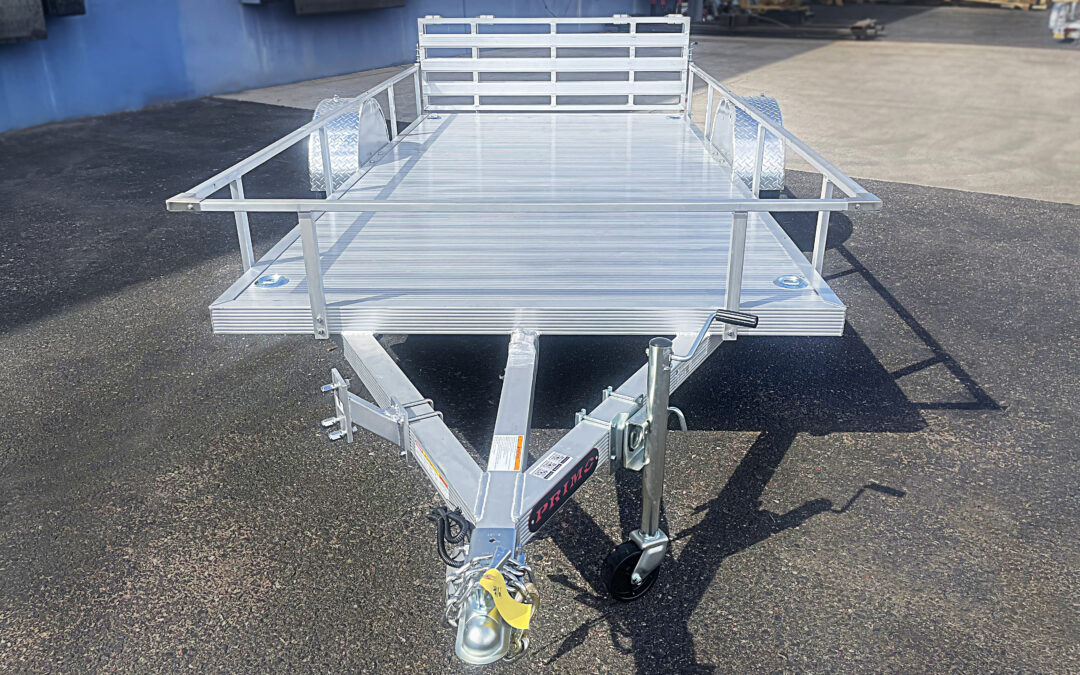The world is rebounding after the onset of the pandemic and a major shift happened that emphasized the importance of being self-sustaining. As losing a job became more likely, people looked to starting businesses that could outlast the effects of another world crisis.
While some businesses may have been declining, businesses like landscaping and lawn maintenance remained steady and even saw an increase. During the pandemic alone, there were 16 million new gardeners and the market size of the landscaping services industry has been steadily increasing on average 2.5 percent between 2016 and 2021 and growing.
There’s a good amount of equipment required to work in the landscaping industry and a single car or truck won’t provide enough space to haul equipment. To fit all the tools and equipment, your best option is to purchase an aluminum utility trailer suited for all your landscaping needs.
What kind of product can handle each of those needs? An aluminum utility trailer. Trailers are incredibly useful and have many uses. While purchasing a trailer is an important decision to make, deciding where to buy a trailer can be a challenging decision, so you’ll want to purchase from a high-rated, trusted company that uses high quality products like Primo Trailer.
Aluminum trailers are some of the best products available in the market today offering a multitude of benefits especially in the landscaping industry. They’re a lighter weight than a steel trailer, a great long term investment, and they’re durable and requiring less maintenance being corrosion/rust resistant.
When looking for an aluminum utility trailer, there are a few things you’ll want to consider. Weight, single or double axle, trailer length and whether it will be open or enclosed.
Weight
Trailer weight will be determined by the rated weight of the equipment of the trailer. For example, mowers will most likely be the heaviest tool on the trailer, so its weight is a necessary factor in determining the equipment load.
The sum of all of the equipment weight becomes your payload weight and it should be added to the empty trailer weight to determine the gross trailer weight or GTW. The GTW should not exceed the trailer’s gross vehicle weight rating (GVWR). To put it simply, the empty trailer weight added together with your payload should not exceed the total weight the manufacturer states. For a single axle trailer, the GVWR is the same as the gross axle weight rating (GAWR). For double axle trailers, the GVWR is roughly twice the amount of the GAWR.
Also, consider your vehicle towing limit, so that your vehicle is not being stressed. When towing, your gas mileage, brake life, and tire wear will be affected so be sure to consider the whole system for the sake of safety.
Trailer length
Most trailers usually come in uniform lengths like 10, 12, or even 16 feet. Generally speaking, the width of your trailer will be 5 to 8 feet wide, so the longer the trailer the wider it will be.
While bigger may not always mean better, there’s pros and cons. With larger trailers, your tow vehicle may struggle because of the trailer’s weight. In addition, length and maneuverability can become a problem depending on where you will be driving.
Enclosed vs Open
Enclosed aluminum utility trailers are becoming more popular especially in climates that suffer from varying weather conditions. With an enclosed trailer, there is less worry about your equipment suffering. Additionally, enclosed utility trailers can protect your equipment from most typical road hazards like stones or other small debris.
Most enclosed trailers are equipped with a sturdy locking mechanism to help make it more secure, preventing potential theft and damage to your equipment. The exterior surface of the trailer not only provides privacy, you can also customize the trailer panels to any advertising needs.
Open aluminum utility trailers are lower to the ground with a lower center of gravity. They are easier to back up since the field of view is easier to see around. They are lighter in terms of their GVWR and more aerodynamic to help reduce drag on open roads and highways. Open aluminum trailers have varied side panels and different heights depending on your need to haul debris. Be sure to check your regional area for tie down laws and restrictions.
In conclusion:
Will the trailer be strong enough for my equipment? Will the trailer be less demanding on my vehicle? How is its maneuverability? Is the trailer at a price point that works for my budget? Good news, you can contact Primo Trailer for exactly that and other answers to your questions.
If you would like to learn more about finding the best aluminum utility trailers to fit your needs, go to www.primotrailer.com. Check out our website and give us a call. We have a variety of aluminum utility trailers. We look forward to helping you with your next purchase!
